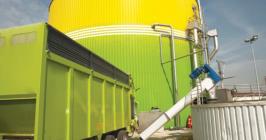

-
-
IRENA (2018), Biogas for road vehicles: Technology brief, International Renewable Energy Agency, Abu Dhabi.
Copied
/-/media/Files/IRENA/Agency/Publication/2017/Mar/IRENA_Biogas_for_Road_Vehicles_2017.pdf?rev=6d690c1f82724429b8fcc186c4cb8503
Copied
Biogas for road vehicles: Technology brief
Newsletter
Switching to biogas as vehicle fuel can reduce greenhouse gas emissions in the transport sector between 60% and 80% compared to fossil-based fuels like gasoline and diesel.
This brief highlights the technologies available – both established and newly emerging – for biogas production and biogas-driven vehicle fleets. It evaluates costs, performance and sustainability and outlines the best practices from around the globe to accelerate uptake of this key renewable transport fuel.
When sufficiently purified, it can be used in place of fossil-based gas to drive natural gas vehicles (NGVs) or dual-fuel vehicles.
Germany, Sweden, Switzerland, the UK and the US were the largest producers of biogas as vehicle fuel in 2016. Worldwide, around 500 plants worldwide produce about 50 petajoules (PJ) per year of such upgraded biogas, often called biomethane.
Countries have promoted biogas-driven cars, trucks and buses through a combination of tax exemptions, investment subsidies, and incentives for biogas injection into the natural-gas grid. China, France, the UK and Scandinavian countries, in particular, have strongly supported the transition to biogas in the transport sector.
Transport accounts for about 30% of global energy use, making renewable transport crucial for a sustainable energy future. Cost reduction remains the critical challenge. Yet increasing synergies with other power and transport technologies could further reduce biogas production costs.
Biogas for road vehicles is one of several briefs from IRENA to focus on renewable-based transport.
Successive technology briefs have highlighted a wide range of renewable energy solutions. Each brief outlines technical aspects, costs, market potential and barriers, combined with insights for policy makers on how to accelerate the transition to renewables.
See also:
Renewable energy options for shipping: Technology brief (2015)




